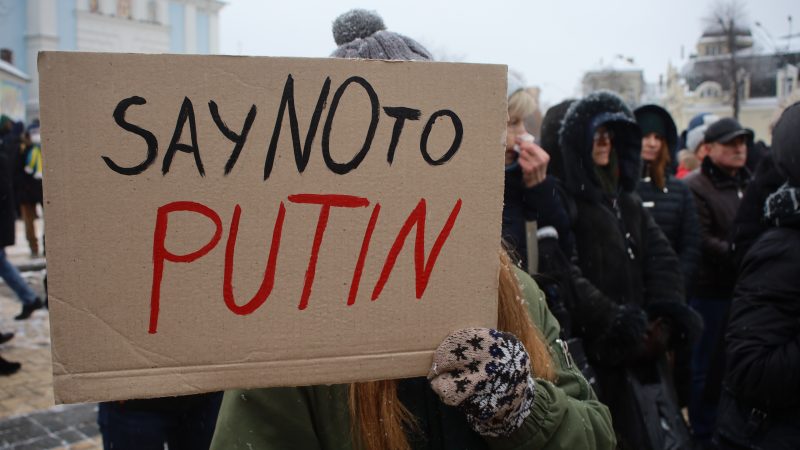
As Keir Starmer and Labour have pummelled Boris Johnson over the seemingly endless succession of lockdown parties in Downing Street, Shadow Foreign Secretary David Lammy and Shadow Defence counterpart John Healey have been on a rather different offensive.
As Russia has mobilised more than 120,000 troops on the borders of Ukraine, sparking fears of an imminent invasion, the frontbench duo have been working, speaking and visiting Kiev together. Their message has been clear: Labour is at least as committed to the defence of Europe as the Tories, more credible on building partnerships abroad and protecting human rights, and clear-eyed about the challenges of an increasingly dangerous world.
This is both good politics and foreign policy. Voters might be more preoccupied with domestic matters, and it is there that the next election will probably be won. But they also want to know that Labour is competent and credible on foreign policy and defence, particularly now in the face of a more authoritarian and aggressive Moscow and Beijing.
This is not simply about copying what the Conservatives might do: the government might be following the right line on Ukraine, but the way it has handled Brexit and its aftermath has not served Britain well. On multiple fronts, the world is heading in the wrong direction – and tackling that means working respectfully with allies and partners, as well as keeping dialogue open with potential adversaries even when they demonstrate different and alarming values.
The post-war world shaped by the 1945 Labour government was not just about building a strong NATO to hold back a totalitarian and expansionist Soviet Union, it was also about building systems, relationships and structures that would make it harder for any state to launch wars of aggression, commit genocide or crush democracy and dissent.
Those battles are now sharply back in focus. With Ukraine, Russia is unambiguously using the threat of overwhelming force – with all the horrors of modern conflict that come with it – to achieve its goals. China is threatening Taiwan with the same, and both Moscow and Beijing clearly hope to use those means to intimidate their neighbourhood and beyond.
In both, that is occurring in tandem with sharply increased repression at home. In the last two years, Vladimir Putin has moved to crush domestic dissent, imprisoning and apparently poisoning opposition leader Alexei Navalny, shuttering human rights groups and opposition parties, and backing even more crackdown in neighbouring Belarus.
China’s authoritarian crackdown is no less alarming, in some ways more so because of the innovative use of surveillance and other technologies – and particularly because of the crackdown on dissent and freedom of speech on Hong Kong and the mass-imprisonment and reported forced sterilisation of the Muslim Uighur minority.
That already represents the largest mass incarceration of a religious or ethnic group since the Holocaust, as well as fulfilling some definitions of genocide. Labour was first to call for sanctions on implicated Chinese officials in July 2020, when Lisa Nandy was Shadow Foreign Secretary. David Lammy has also made it clear that he views similarly targeted sanctions as a key foreign policy tool more broadly.
This isn’t about becoming Russia or Chinaphobic. Labour is an internationalist party, Britain is an internationalist country and there are plenty of areas for joint effort based on mutual respect, whether that’s tackling climate issues or transnational crime, or indeed nuclear arms control in an era where the risk of cataclysmic conflict is clearly rising. But what is happening in Russia and China increasingly looks like part of a much broader, wider global human rights crisis. From Myanmar to Burkina Faso, Ethiopia to Kazakhstan, we are seeing alarming trends of mounting repression. Stopping that is not going to be easy, and Britain has little chance of doing it alone.
This that’s where Labour should directly contrast its approach with that of the Conservatives. Too much of the last decade has been spent in reductive arguments with those who should be amongst our closest international partners. As David Lammy put it at the Fabian Society conference this month, “this is no time for arguments with the French on fish”.
Britain under Labour should be at the forefront of partnerships and solutions to address our most urgent world problems, many of which will only stoke the flames of conflict further: particularly climate change and a rising global wealth gap, the latter a key factor in unrest in Kazakhstan. Successive UK governments – including New Labour – have been far too sanguine about letting London become the playground and money-laundering den for oligarchs, and we should be blunt about learning from our own mistakes.
That includes those that followed 9/11, where we went too far in tearing up the international rulebook with the invasion of Iraq, extraordinary rendition and a blurring of the lines on things like torture. That was an extraordinary error – and we are discovering once again just how important such red lines are in keeping us and the world secure and stable.
Care about Labour and foreign policy? Join the Labour Foreign Policy Group…




More from LabourList
‘The hope that kills you’: Reflections from the final day in Gorton and Denton
MPs, union leaders and organisations react to ‘bruising’ Gorton and Denton result
A gory night for Labour